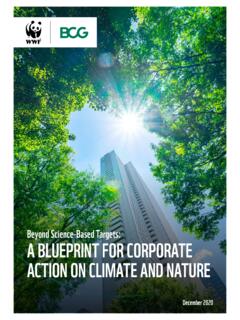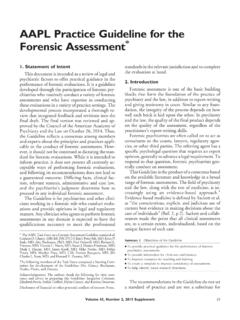Transcription of PRINCIPLES OF INTERNATIONAL ENVIRONMENTAL LAW
1 INT THE INTERNATIONAL SEABED AUTHORITY AND PRINCIPLES OF INTERNATIONAL ENVIRONMENTAL LAW CRITIQUE AND RECOMMENDATIONS SEPTEMBER 2020 David SHALE / WWF David Shale / WWF 2 The INTERNATIONAL Seabed Authority and PRINCIPLES of INTERNATIONAL ENVIRONMENTAL Law Critique and Recommendations This report was written for WWF with contributions from Hannah Lily and Layla Hughes September 2020 WWF 3 Executive summary The INTERNATIONAL Seabed Authority (ISA) faces the challenge to manage the proposed extraction of minerals from the deep seabed - the Earth s largest and least-understood habitat and at the same time to protect the marine environment from any impacts, should a decision be made for this new extractive industry to go ahead.
2 However, concerns are being raised about whether the ISA is fit for purpose to carry out this dual responsibility, in particular in the face of growing pressures on the world s ocean as well as in the context of the United Nations 2030 Agenda for Sustainable Development. The ISA is also empowered to support growth in the market for the metals1 under its competency, and to create a mining limb that will enable the ISA itself to participate directly in the extraction, transportation, processing and marketing of the minerals2. Permitting mining would generate revenue that could fund the administrative costs of the ISA, and give it a raison d tre. As a result, the ISA faces in-built conflicts of interest, which will need careful management and accountable governance structures to avoid procedural impropriety, opacity, bias, corporate capture and consequently, poor outcomes for humankind3.
3 This set up of the ISA thus poses additional risk to the achievement of sustainable development and reducing the stressors on our ocean. The ISA is not and must not be operating in a vacuum. PRINCIPLES of ENVIRONMENTAL law have evolved since the ISA s inception, and these directly address potential pitfalls of natural resource governance. These PRINCIPLES include: sustainable development; do no ENVIRONMENTAL harm ; the precautionary principle, and public participation. As the custodian of the world s largest environment, representing the largest possible constituency (all of humankind, now and in the future), the ISA should embrace a modern interpretation of the United Nations Convention of the Law of the Sea (UNCLOS) in keeping with the highest standards of ENVIRONMENTAL justice and democracy.
4 The report puts forward a set of practical recommendations that the ISA needs to implement to achieve these standards. These are set out in bold and dark orange, for ease of reference. 4 Introduction The INTERNATIONAL Seabed Authority (ISA) faces the challenge to manage the proposed extraction of minerals from the deep seabed - the Earth s largest and least-understood habitat, while at the same time also being in charge protecting the marine deep sea environment. The minerals located in INTERNATIONAL waters are designated the common heritage of [hu]mankind by the treaty that governs them (the UN Convention on the Law of the Sea or UNCLOS ), and the ISA is required to act on behalf of humankind as a whole.
5 Several tenets of INTERNATIONAL ENVIRONMENTAL law have evolved since the 1960s-1990s negotiations of UNCLOS and the conception of the ISA, which are applicable to natural resource governance. These include: sustainable development do no ENVIRONMENTAL harm the precautionary principle, and public participation This paper explains these four PRINCIPLES , and examines the application of them at the ISA. The analysis focuses on two levels. Firstly, to what extent these PRINCIPLES are supported (or hindered) by UNCLOS, as the ISA s governing instrument. Secondly, the paper examines what the ISA is doing, or could do better, to implement these PRINCIPLES in practice. Sustainable development a.
6 What is it, and why is it important? Sustainable development is Development that meets the needs of the present without compromising the ability of future generations to meet their own needs. 4 An INTERNATIONAL sustainable development agenda and a set of corresponding sustainable development goals (SDGs) were agreed by all United Nations member States in 2015. These include a goal dedicated to the conservation and sustainable use of the oceans and marine resources (SDG 14), and other goals relevant to seabed mining. The SDGs recognise the link between ENVIRONMENTAL degradation and human vulnerability and poverty. Sustainable development PRINCIPLES are founded on the basic truth that, without a healthy environment and continued access to natural resources, humans cannot survive.
7 Sustainable development as a principle is therefore closely related to the doctrine of intergenerational equity, an important and rapidly developing principle of contemporary ENVIRONMENTAL law 5 and a universal value shared amongst humanity 6 included in 44 INTERNATIONAL legally binding instruments and over 60 national constitutions,7 which obliges the present generation to protect and conserve cultural and natural resources for future Sustainable development and intergenerational equity require the global population to operate within planetary boundaries. This requires sustainable consumption and production patterns (as identified by SDG 12).
8 Thus, the development of non-renewable resources must be based not only on regulating how extraction takes place (for example through labour and ENVIRONMENTAL standards) but also in determining whether extraction should occur at all and if so, at what UNEP s INTERNATIONAL Resource Panel in 2019 proposed ambitious efficiency, consumption, and production policies to reduce the 5 extraction of metals by almost 50% by 2060, compared to a business-as-usual Sustainable development also requires urgent global action to combat climate change and its impacts (SDG 13), including via greenhouse gas emission reduction measures agreed by State Parties under the United Nations Framework Convention on Climate Change (UNFCCC).
9 B. Does UNCLOS hinder or support implementation of the principle of sustainable development at the ISA? Although provisions in UNCLOS identify the importance of protecting the environment, wider issues related to sustainability do not explicitly feature, while economic motivations feature prominently. Considerations about planetary boundaries, and the finite limits that exist for non-renewable mineral resources, as well as climate change, are absent. UNCLOS Part XI, pertaining to the seabed minerals found in areas beyond national jurisdiction, is a sector-specific framework, so it does not address questions of sustainability of consumption, nor does it promote consideration of whether alternative options can be found.
10 The provisions of UNCLOS that establish the ISA tend to focus specifically on its management of mineral exploration and The weight the Convention places on this singular purpose is considerable, and reflects a historic view which appears to have over-played resource potential and under-considered management of impacts on the biodiversity and ecosystem services of the Even so, in the policies aimed at resource development ( mining), UNCLOS does import some ideas about sustainable levels of exploitation, by requiring a focus on orderly, safe and rational management of the resources [..] in accordance with sound PRINCIPLES of conservation, the avoidance of unnecessary waste.







